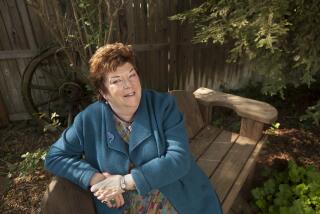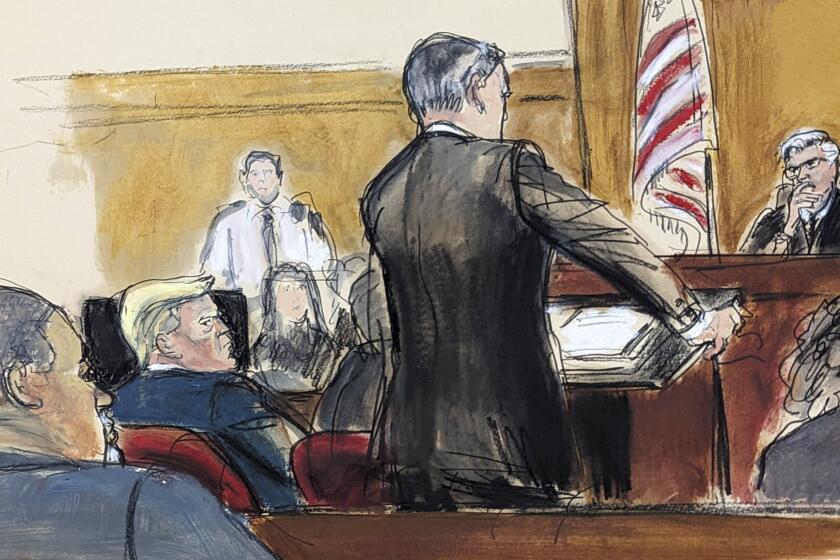Waters Focuses Her Rage at System : Politics: She says inner-city woes have been simmering and need action.
There are times when the pain that she manages to hide so well bubbles to the surface, when the caustic, angry voice gets thick and the words come hard, when the eyes well up. But those times are few and far between for Rep. Maxine Waters, a Democrat whose congressional district is in the heart of the riot area, whose own legislative office was lost to a fire started by a mob.
Most of the time, especially after the rioting, Waters is too busy being angry to cry, too busy giving voice to the rage that many of her constituents felt when they took to the streets, too busy being herself.
In turn, Waters has become part of the story.
Waters, one of the nation’s most powerful African-American elected women and an adviser to Democratic presidential candidate Bill Clinton, has been slow to condemn the rioters. And for that, she herself is being condemned.
At work in Washington when the rioting broke out, Waters, who has credibility with the political Establishment as well as with gang members and welfare mothers, was immediately thrust into the spotlight. On one local or national television appearance after another, first in Washington and then in Los Angeles, Waters was pushed to utter the words that many, particularly whites, wanted to hear--a condemnation of the looters, a prayer for peace on the streets, an exhortation that the rioters return home, cool off.
Even Rodney G. King, whose name was the rallying cry of the rioters, pleaded for calm.
But not Maxine Waters.
The 53-year-old lawmaker did say: “Most reasonable human beings abhor violence, and I do, too. It is wrong to burn, to kill, to loot.” She also pointed out that she spent long, quiet hours in housing projects trying to calm raw feelings, but what people remember is that when given chance after chance at air time, she instead vented her anger.
Waters’ anger, like that of her constituents, targeted what she said were years of indifference by the political power structure, the unshakable poverty of the inner city, and a federal government that seems more concerned with putting Eastern Europe back on its feet than with America’s blighted cities.
When asked about white fear, she instead talked about black fear. Asked to condemn the looters, she instead raked President Bush over the coals. When the focus was put on problems in her district, she retorted that the problem is that there is something “desperately wrong” with America.
At times, she or her name seemed everywhere. No stranger to the spotlight, she has been covered by the national media before, mostly because of her efforts working on Jesse Jackson’s two presidential campaigns. Whether it was joining in with Crips and Bloods gang members in a communal dance called the electric slide at a housing project party, or throwing off a line about Bush, television cameras seemed to be everywhere she went.
Along with the limelight came some heat. The Orange County Register was sharply critical of her in an editorial; conservative radio talk show host Rush Limbaugh denounced her, and television commentators Sam Donaldson and Robert Novak questioned her reluctance at condemning the rioters.
But she also had her defenders, including New York Post columnist Amy Pagnozzi, who said Waters would make a good vice presidential running mate for Clinton, in part because she could provide some “spine” for the Democratic candidate.
Waters said she jumped at the chance for such exposure because she did not want others defining what she saw happening in her community.
“We had to go beyond people thinking that the video (of King being beaten by police) created all of this frustration. (The problem) has been simmering because of a lack of attention to these inner cities for so long. The hopelessness, the unemployment, the frustration has been festering. The jury verdict was just the straw that broke the camel’s back,” she said.
Waters has been talking angrily about inner-city conditions for more than two decades. One of 13 children born to a St. Louis woman who was on and off welfare, Waters has been around poverty all her life. In high school, she worked in a restaurant that refused to serve blacks and forced her to eat in the basement. She got involved in local issues in Los Angeles during the 1960s, worked as a teacher in the Head Start program, helped Mayor Tom Bradley get elected in 1973, then won a seat in the state Assembly in 1976.
During her rise in the political world, the congresswoman has stayed close to her political base in Los Angeles. She makes her permanent home here, commuting to Washington. Over the years, Waters has become financially comfortable. She is married to Sidney Williams, a former professional football player who sells Mercedes-Benzes in Hollywood.
Personally, she feels comfortable anywhere in her district, whether talking with gang members or speaking to a church group. She treats the burning of her office not as a personal insult but as a byproduct of the rioting. Her office was adjacent to the Broadway Federal Savings and Loan complex on South Broadway at 45th Street. Waters’ staff said the structure went when another fire apparently spread through the roof. Waters shrugs off the loss, saying she is “not angry at all” and considers the office to be just “one of the victims of the rebellion.”
Over the years, Waters has won a wide following. In the Legislature, she sponsored many bills dealing with minority and women’s rights, such as pay equity and minority contracting in state agencies. One of her bills prevented strip searches for nonviolent misdemeanor crimes; another stretched prison terms for drug dealers carrying weapons.
She played a leadership role in preventing cuts in welfare budgets when George Deukmejian was governor, and helped lead the fight to force state pension funds to give up investments in companies that did business in South Africa.
In Congress, Waters has been relatively quiet since replacing longtime Rep. Augustus F. Hawkins in 1990. As the only black representative assigned to the House Veterans Affairs Committee, Waters called on the committee to hire more minority staff members, saying it was ridiculous that the committee’s policy staff was all-white when more than one-fourth of U.S. servicemen and servicewomen are black. Since then, the Veterans Committee has added two black members to its staff.
Waters, as a member of the Banking, Finance and Urban Affairs Committee, also has kept up a running commentary on the abuses and costs of the savings and loan scandals.
She loves to point out how differently corporate criminals are dealt with compared to poor lawbreakers, and how much money has been poured into the failed savings and loans in contrast to the reluctance of Congress to approve new spending for the cities. Waters said part of her anger stems from knowing that women who loot stores to steal diapers may face much longer jail terms than executives who loot savings and loan institutions.
Kathy Garmezy, director of the Hollywood Policy Center, said Waters’ influence goes well beyond inner-city issues. “In the women’s community, she has always been considered a leader on legislative issues, a fighter for things that mattered for women and their families, like day care and health care issues, pregnancy issues. For a long time, she’s worn a much bigger hat than just her (district) constituency,” Garmezy said.
A critic, conservative Assemblywoman Cathie Wright (R-Simi Valley), was on the opposite side of most important issues when she and Waters served together in the Legislature. Wright said she was offended by Waters’ criticism of the not guilty verdicts by the Simi Valley jury for the four officers in the King beating trial.
“The problem I have with her are her accusations that we were racists but she wasn’t. She always assumed that everything you said was because you were white and she was black,” Wright said. “. . . Whenever (Republicans) disagreed with her, she said we took the position we did because we were racists.”
Rep. Elton Gallegly, a Republican who represents Simi Valley in Congress, denounced Waters for her statements that Simi Valley is an all-white community and that King “never had a chance” once the trial was transferred to the Ventura County city.
“I was really offended, and the people of Ventura County were really offended,” said Gallegly, a former Simi Valley mayor.
Waters shrugs off critics. “There are going to be those who are angry with Maxine Waters no matter what she does,” she said.
The congresswoman said she first called for the resignation of Police Chief Daryl F. Gates 14 years ago, soon after he was appointed. Six months ago, she stayed overnight in a housing project to dramatize the plight of unemployed, homeless inner-city young people. If it took a riot to get people’s attention, so be it, Waters said.
“I would not be able to be on national television, able to tell our story, if it had not happened,” she said. “Bush would not be in Los Angeles today if it had not happened.”
She also said corporations are paying attention. She said she either has had conversations or is scheduled to meet with executives from McDonald’s restaurants, the Bank of America, Pacific Telesis and other corporations.
Waters readily admits that a criminal element participated in the rioting and believes that those who threw firebombs or physically harmed others should be dealt with quickly and harshly by the criminal justice system.
At the same time, she calls the violence “a spontaneous reaction to a lot of injustice and a lot of alienation and frustration,” and defends poor women who stole necessities for their families.
On Michael Jackson’s KABC radio talk show, Waters said: “There were mothers who took this as an opportunity to take some milk, to take some bread, to take some shoes. Maybe they shouldn’t have done it, but the atmosphere was such that they did it. They are not crooks.”
Later, she told a Times reporter: “One lady said her children didn’t have any shoes. She just saw those shoes there, a chance for all of her children to have new shoes. Goddamn it! It was such a tear-jerker. I might have gone in and taken them for her myself.”
An aide, Rod Wright, said: “She says and does a lot of the things the people in the (South Los Angeles) community think need to be said and done. White folks think things ought to be done the way white folks think they should be done. They’d like her to go out in the district and say: ‘Now, you all cool it,’ and condemn the looters as hoodlums and thugs. But if she did that, she’d end up where they are, with no credibility.”
In the meantime, Waters said, she will continue doing what she has been doing, hoping that sometime she will see improvement.
Sitting in an airport coffee shop recently, one of several makeshift workplaces she is using until she can replace her burned-out office, she said: “My life has to be about optimism. I can never believe that nothing can be done. I can never believe that there can’t be change. I have to believe that not only can we change things, but that I can contribute to that.”
Times staff writer Glenn F. Bunting contributed to this report.
More to Read
Get the L.A. Times Politics newsletter
Deeply reported insights into legislation, politics and policy from Sacramento, Washington and beyond. In your inbox three times per week.
You may occasionally receive promotional content from the Los Angeles Times.






